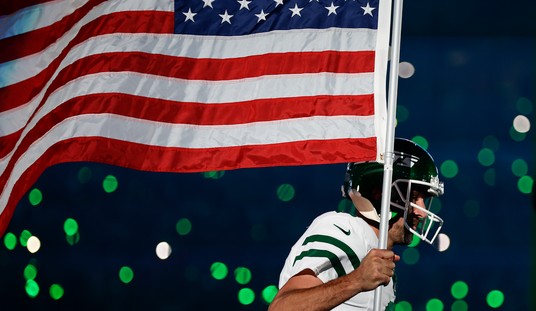
Today’s a special day in the RedState Department of History. Today, your correspondent’s favorite movie celebrates the 75th anniversary of its first screening.
I speak of Casablanca, undeniably one of the masterpieces of American cinema and arguably the greatest movie ever made.
For those of you who have managed to go through life without ever seeing it, Casablanca features a classic love triangle set in World War II North Africa.
Rick Blaine (Hunphrey Bogart) operates Rick’s Café Americain, the hottest spot in Casablanca. It becomes hotter still when a man named Ugarte (Peter Lorre) entrusts Rick with two precious letters of transit out of the Vichy French-occupied city. Ugarte is killed and Rick becomes the holder of the letters. Enter Ilsa Lund (Ingrid Bergman), Blaine’s former lover. She’s with her husband Victor Laszlo (Paul Henreid) — who she thought was dead when she fell in love with Blaine. Laszlo is a resistance leader badly wanted by the Nazis, and wants the letters from Rick. The problem is that Ilsa left Rick in the lurch when the two were planning to flee Paris in advance of the German occupation in 1940, after learning her husband was alive — and he still loves her.
This presents Blaine with the classic choice: what to do with the letters? Should he reclaim Ilsa or let her go with Victor? It’s his call.
The thing of it was, when the actors arrived on set to shoot the final scene, nobody knew the answer.
Casablanca had no right to be as good as it was, according to film historians. Loosely based on a stage play known as “Everybody Comes to Rick’s,” writers soon realized that the play was not adaptable to film.
As such, writers Julius and Philip Epstein began to rewrite the script but left the picture after a month. Enter Howard Koch, who took over the project only to see the Epsteins return shortly afterward. So all three worked on the script — but reports indicate the three writers never worked on the script at the same time in the same room.
A script of the movie makes the following note in its preface:
“When production began, the script was only half completed. Near the end of production, the script was literally being written the night before, and in the final days of filming, the dialogue for some scenes was written while shooting was actually in progress and then rushed to the set.”
In fact, it was such a mishmash that Bogart reportedly rarely spoke to Bergman when they weren’t on the set. His marriage was on the rocks and Bogart reportedly took to the bottle when not shooting. As such, the cinematic chemistry between the two was never likely and in fact, none of the movie’s three main stars even wanted to be in the picture:
According to Charlotte Chandler, who wrote the Bergman biography Ingrid, Bergman and Bogart had a get-to-know-each-other lunch before the film began. “Ingrid remembered that the only subject they found in common was how much they both wanted to get out of Casablanca.”
The script writing was so rushed that when Bergman arrived on the set to shoot the final scene, she didn’t know which man her character was supposed to end up with. As Koch recalled:
Ingrid Bergman came to me and said, ‘Which man should I love more …?’ I said to her, ‘I don’t know, play them both evenly.’”
But even after the close of shooting, the film still wasn’t finished. The movie’s iconic last line, spoken by Blaine to Captain Louis Renault (Claude Rains) — “Louis, I think this is the beginning of a beautiful friendship” — wasn’t added until a month after the last scene had been shot and was overdubbed by Bogart in the studio.
The results, of course, were legendary. Bergman became a major star, Bogart earned an entirely new reputation as a leading man, and everything came together in a way nobody had foreseen. Casablanca won three Oscars including Best Picture, Best Director for Michael Curtiz, and, amazingly given how it was written, Best Screenplay.
It’s interesting that a movie that was almost literally thrown together should have produced so many iconic lines and phrases, some of which are still used in common parlance today:
“Here’s looking at you, kid.”
“Round up the usual suspects.”
“I’m shocked, shocked to find that gambling is going on here!”
And of course, the phrase every man who has lost a lover can utilize if he’s seen this immortal picture:
“We’ll always have Paris.”
Happy Sunday and enjoy today’s open thread!













Join the conversation as a VIP Member